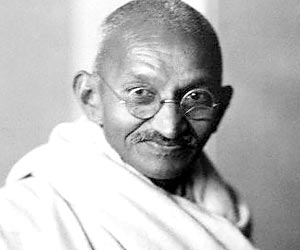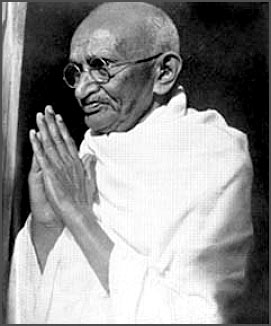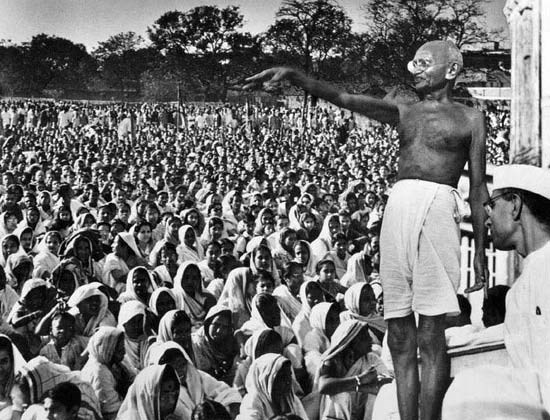"Nonviolence is the law of the human
race and is infinitely greater than and superior to brute force" (Kumar Bose, Nirmal. "Mahatma Gandhi."). Mahatma
Gandhi always spread this to everyone and
it certainly states he did not believe in violence nor did he want violence;
but he wanted non-violence. Gandhi was born on October 2, 1869 in the town of
Porbander, India to Karamchandi Gandhi and Putlibai Gandhi. Early in his
childhood, he went to school in Rajkot, India and later he traveled to London
for college to study law. In London, not only did he study law, but he also
helped the poor and countless people who struggled
to face hardships in life. In 1896 he traveled to South Africa to preach to the
people the policy of passive resistance or being able to have the ability to
have power by using non-violent methods. In South Africa, he got harassed many
times because many people opposed him but that did not interfere with his
goals. Gandhi was responsible for an important event in India's history when he helped India gain independence from British rule on August 15, 1947. During his life, he had many
accomplishments like studying law, winning political debates, freeing India from British rule, spreading rules and regulations, and most
of all spreading peace around India. Many people looked up to Gandhi as a hero
and an inspiration because he always had courage and bravery to succeed in what
needed to become accomplished.
 |
| Mahatma Gandhi looking brave (http://www.cinejosh.com/andhra-daily-telugu-news/19739/mahatma-gandhi-baptized.html ()) |
Bravery is something Gandhi
always held with him because he always was brave enough to accomplish his goals.
An amazing quote about Gandhi saying neither to kill nor to be violent by using
bravery is: "Non-violence
does not require any outside or outward training. It simply requires the will
not to kill even in retaliation and the courage to face death without revenge.
This is no sermon on ahimsa but cold reason and the statement of a universal
law. Given the unquenchable faith in the law, no provocation should prove too
great for the exercise of forbearance. This I have described as the
non-violence of the brave" (No Author. "Mahatma Gandhi."). In
this quote Gandhi describes his belief in non-violence by saying killing is not necessary but instead
non-violence should occur through your bravery. Gandhi always believed in
peace instead of violence because he thought peace would help one calm down and
live an easier life. He not only
wanted to create peace for himself, but he was brave enough to spread it
through India: "Gandhi traveled through
India, teaching and demanding eradication of
"untouchability." The esteem in which he was held was the measure of his
political power." (Martin Green. "Mahatma Gandhi"). He traveled from town to
town in India just so the people could understand the proper rules of life like
ahimsa. Gandhi did this because he wanted the communities to get closer
together and become friendlier. Gandhi did everything he could to stave off
hardships and help people.
 |
| Gandhi with courage (http://www.namaste-valley.com/inspirations.html ()) |
Gandhi not only possessed bravery, but also was full of courage
to succeed. Despite being harassed, Gandhi stepped up to the plate by doing a
courageous act: Gandhi remained in South Africa for twenty years,
suffering imprisonment many times. In 1896, after being attacked and humiliated
by white South Africans, Gandhi began to teach a policy of passive resistance
to, and non-cooperation with, the South African authorities. (Martin
Green. "Mahatma Gandhi.").Gandhi
preached to South Africa to teach the policy of passive resistance to improve
the community there to teach some regulations of life. Even though he faced
tough obstacles there, he still continued to work toward his goal with courage.
Gandhi always taught and explained how life should become properly lived: "Gift
of life is the greatest of all gifts; a man, who gives it in reality, disarms all
hostility. He has paved the way for an honorable understanding. And none who is himself subject to fear can bestow
that gift. He must therefore be himself fearless. A man cannot practice ahimsa
and be a coward at the same time. The practice of ahimsa calls forth the
greatest courage." ("Mahatma Gandhi.") This
also means that those living their life properly will
benefit the most from it and will fully understand how to succeed in life.
Along with that, he explained if
you want to commit an honorable understanding you would need to have faith and
be fearless. Gandhi always showed courage in the greatest obstacles he faced
and he always brought courage and hope to many others.
 |
| Gandhi an hero (http://www.myhero.com/go/hero.asp?hero=M_Gandhi2_nehs_US_2011 ()) |
Many people look up to Gandhi as a hero and an
inspiration because he always had the courage and bravery to succeed in what
needed to be accomplished. Gandhi always tried his hardest to accomplish
his goals. Some of his accomplishments are writing the autobiography of himself
in his early childhood, helping India's economy by selling goods, getting India
out of British rule, and helping many to
accomplish their goals to succeed. He did all of this with 2 things: courage and
bravery. Gandhi encourages me to try my best to succeed in life. He makes me
want to have courage in myself when I face hardships. He inspires me a lot
because of his many great accomplishments. The reason he believed in
non-violence makes me want to live a peaceful life. When some people go through a
time of difficulty, they also remember to have the courage needed. Even though
Gandhi is not here to guide us anymore, his inspiration and heroic traits are passed down from generation to generation.
Works Cited
Kumar Bose, Nirmal. "Gandhi's
Views - Peace, Nonviolence and Conflict Resolution." Non-violence.
Bombay Sarvodaya Mandal and Gandhi Research Foundation, No Date. Web. 11 Apr.
2012.
Martin, Green. "Kamat's
Potpourri: Mahatma Gandhi - A Biography." Gandhi: A Biography.
Kamat, 15 Aug. 1997. Web. 11 Apr. 2012.
No Author. "Mind of Mahatma Gandhi
: Complete Book Online." Training for Non-violence. Bombay
Sarvodaya Mandal and Gandhi Research Foundation, No Date. Web. 11 Apr. 2012.
Page created on 4/24/2012 12:00:00 AM
Last edited 4/24/2012 12:00:00 AM
Gandhi Book Centre. "Articles." Mahatma Gandhi's . 2011.
